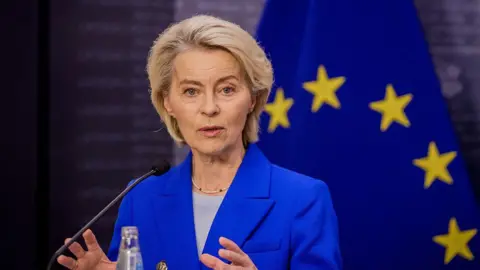Ursula von der Leyen, the President of the European Commission, has successfully weathered a confidence vote sparked by a far-right faction within the European Parliament. Despite the eventual outcome being predictable—von der Leyen receiving a majority support—her administration's challenges became evident, particularly after she commenced her second term just a year earlier.
Confidence votes, such as the one initiated by Romanian far-right MEP Gheorghe Piperea, are infrequent, with the last occurring over a decade ago against former Commission chief Jean-Claude Juncker. To pass the motion against von der Leyen, a threshold of two-thirds, or 480 out of 720 Members of the European Parliament (MEPs), was required. Ultimately, only 175 voted in favor, while 360 opposed the measure, and 18 abstained.
The motion was rooted in accusations of a lack of transparency concerning von der Leyen's private communications with Pfizer during Covid-19 vaccine negotiations, leading Piperea to suggest that her leadership could not be trusted to uphold essential democratic values. During a heated debate prior to the vote, von der Leyen rebuked her detractors, describing them as "conspiracy theorists" and labeling their claims as false allegations against her leadership, particularly concerning what had been termed “Pfizergate.”
Despite support from some extremist elements, including notable figures like Hungarian Prime Minister Viktor Orban, the far-right's influence was divided, particularly within the European Conservatives and Reformists (ECR) group, where some members, including MEPs from Giorgia Meloni's Brothers of Italy party, chose to back von der Leyen instead.
The Parliament's vote showcased that von der Leyen's center-right European People's Party (EPP) maintained essential backing, along with support from the Socialist & Democrats (S&D), the liberal Renew party, and the Greens bloc. However, leading up to the vote, many expressed concerns about von der Leyen's alignment with the far-right on numerous legislative issues, particularly regarding migration and climate policies.
Valérie Hayer, the leader of the centrist Renew Europe group, indicated that support for von der Leyen was contingent upon her distancing from far-right alliances, urging her to assert stronger control over the EPP. In a later statement, Iratxe García, the S&D leader, highlighted the irresponsibility of destabilizing the Commission amid mounting global crises, insisting that their vote did not signify blind support.
While in Rome for the Ukraine Recovery Conference during the vote, von der Leyen addressed the motion's outcome on social media, affirming the EU's resolve against destabilization efforts. "As external forces seek to destabilise and divide us, it is our duty to respond in line with our values," she declared, concluding with a heartfelt "long live Europe."
Confidence votes, such as the one initiated by Romanian far-right MEP Gheorghe Piperea, are infrequent, with the last occurring over a decade ago against former Commission chief Jean-Claude Juncker. To pass the motion against von der Leyen, a threshold of two-thirds, or 480 out of 720 Members of the European Parliament (MEPs), was required. Ultimately, only 175 voted in favor, while 360 opposed the measure, and 18 abstained.
The motion was rooted in accusations of a lack of transparency concerning von der Leyen's private communications with Pfizer during Covid-19 vaccine negotiations, leading Piperea to suggest that her leadership could not be trusted to uphold essential democratic values. During a heated debate prior to the vote, von der Leyen rebuked her detractors, describing them as "conspiracy theorists" and labeling their claims as false allegations against her leadership, particularly concerning what had been termed “Pfizergate.”
Despite support from some extremist elements, including notable figures like Hungarian Prime Minister Viktor Orban, the far-right's influence was divided, particularly within the European Conservatives and Reformists (ECR) group, where some members, including MEPs from Giorgia Meloni's Brothers of Italy party, chose to back von der Leyen instead.
The Parliament's vote showcased that von der Leyen's center-right European People's Party (EPP) maintained essential backing, along with support from the Socialist & Democrats (S&D), the liberal Renew party, and the Greens bloc. However, leading up to the vote, many expressed concerns about von der Leyen's alignment with the far-right on numerous legislative issues, particularly regarding migration and climate policies.
Valérie Hayer, the leader of the centrist Renew Europe group, indicated that support for von der Leyen was contingent upon her distancing from far-right alliances, urging her to assert stronger control over the EPP. In a later statement, Iratxe García, the S&D leader, highlighted the irresponsibility of destabilizing the Commission amid mounting global crises, insisting that their vote did not signify blind support.
While in Rome for the Ukraine Recovery Conference during the vote, von der Leyen addressed the motion's outcome on social media, affirming the EU's resolve against destabilization efforts. "As external forces seek to destabilise and divide us, it is our duty to respond in line with our values," she declared, concluding with a heartfelt "long live Europe."




















